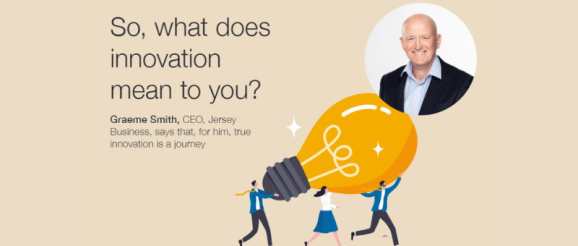So what does innovation mean to you? | Jersey Business

For me, true innovation is a journey.
It starts with creativity, then testing and proof of concept. Only then can delivery, sales and growth happen. At each stage success requires a mindset that is curious about how things work but also an ability to ‘think outside the box’
The most widely acknowledged successful innovator of all time was Thomas Eddison, as he had over 1,000 patents for inventions. For me though I would reference Marie Curie as one of the most influential innovators.
Born in Warsaw, Poland in 1867, she took her late husband Pierre’s place as Professor of General Physics in 1906 as first for a woman at the Sorbonne. Through developing further the theory of radioactivity and in particular the isolation of radium during World War I, she brought portable x-ray machines to the battlefield, heralding the x-ray as one of modern medicine’s greatest advances. For this she was awarded the Nobel prize twice, the only woman to have ever achieved this.
She famously said ‘Be less curious about people and more curious about ideas’.
More recently James Dyson in developing the revolutionary cyclone technology spent 15 years and over 5,000 prototypes in the first two stages of his innovation journey. Interestingly no manufacturers would pay the licensing fees as they thought it would reduce their margins. So, Dyson had to adapt from being an inventor and creative to setting up his own manufacturing company to achieve success in the third stage.
His favourite quote of mine ‘Success teaches you nothing. Failures teach you everything. Making mistakes is the most important thing you can do’
Compare this with Bill Gates and the building of the Microsoft corporation. Yes, he undoubtedly was a highly innovative young student with skills to build and develop software in what was the very early stages of the computer age. When he was approached by IBM to provide the operating system for their first personal computer however, he was smart enough to realise he didn’t have the best solutions, so he identified and bought an operating system called ’86 DOS’ which he then introduced to IBM. From there on his skill was to continually add other creative ideas (some purchased, some developed in house) such as the mouse and the Windows operating system.
My favourite Bill Gates quote ‘Our success has really been based on partnerships from the very beginning’
So, an individual can be innovative, a business clearly can be, but what about an entire sector/ or industry. As an avid Formula 1 fan, I would suggest this industry has had huge impact on the wider motor industry as a whole and in some ways is the motor industries R&D team. Interestingly though whilst there are often major leaps in F1 technology, most of the improvements come from what is known as ‘the aggregation of marginal gains’ a concept pioneered initially in sports such as cycling. So innovation does not always have to be a major invention, F1 focusses on fraction of second gain in performance achieved through minor changes/ tweaks.
So, my question to you and your own business is, 1) do you encourage ‘out of the box thinking’, 2) do you view ‘early-stage’ issues as learnings and 3) do you constantly look for ways to make those small marginal gains in improving your productivity.
Any business that that can answer yes to those questions in my view is a highly innovative business and will achieve sustainable growth.
Article first appeared in the Business Brief Magazine November 2022
